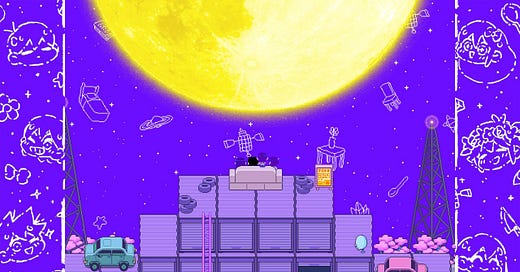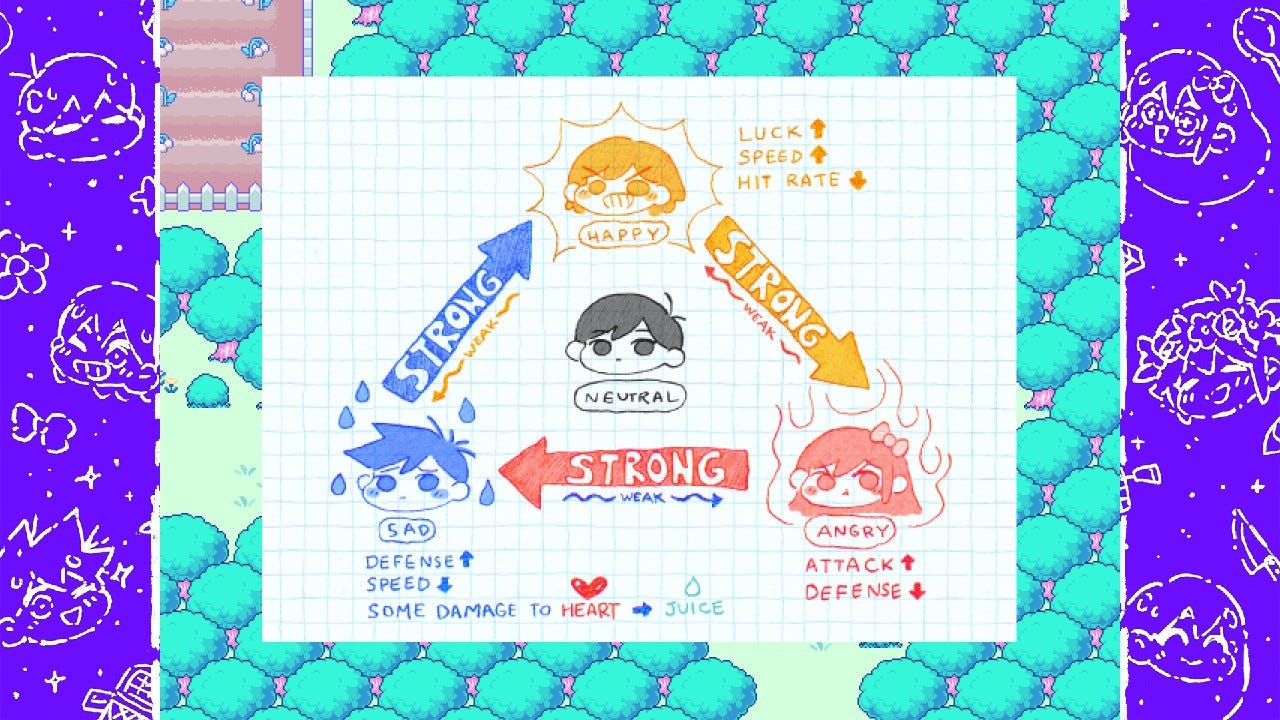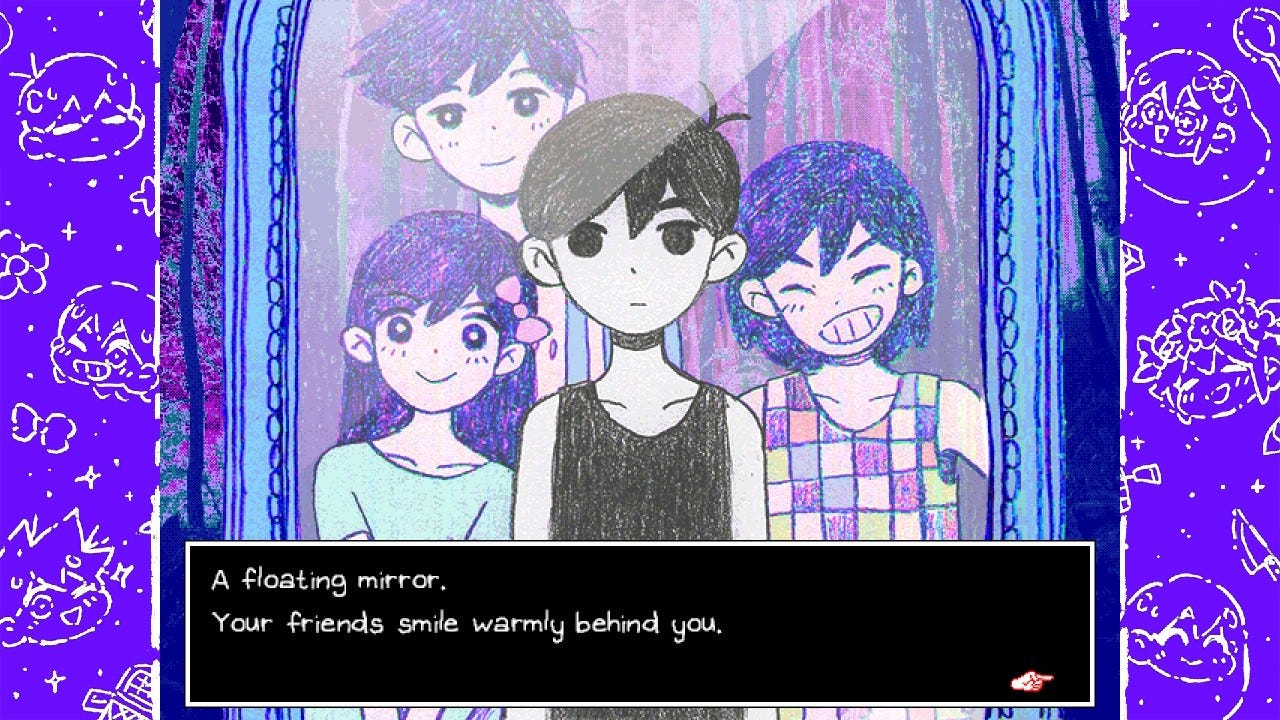Circuits & Synapses Gaiden: Exploring Mental Health Through OMORI’s Emotion-Driven Battle System
In the realm of video games that tackle mental health themes, OMORI stands out not only for its poignant narrative but also for its innovative gameplay mechanics.
While this game's aesthetic is often cute and child-like, it's rated M for Mature and deals with heavy themes including self-harm and suicide. It is not suitable for children and may be triggering for teenagers and adults. Oddly, Common Sense Media (my go-to source for this type of information) doesn't cover OMORI, so I'll link to the ESRB description.
With that said, OMORI's unique approach to combat is a powerful metaphor for the internal struggles many face with their mental health, offering a tangible way to engage with complex emotional concepts.
Emotional Landscapes
OMORI is a psychological horror RPG that delves deep into themes of anxiety, depression, and trauma. The game’s battle system is intrinsically tied to these themes, using four emotions as core mechanics:
Happy
Angry
Sad
Afraid
These emotions aren’t just flavor text; they directly impact battle performance and strategy, mirroring how our emotional states affect our ability to navigate real-life challenges.
The Mechanics of Emotion
In OMORI, each emotion has strengths and weaknesses against others:
• Happy is strong against Angry but weak to Sad
• Angry is strong against Sad but weak to Happy
• Sad is strong against Happy but weak to Angry
Meanwhile, the Afraid status is generally disadvantageous, reflecting how fear can often be paralyzing in real-life situations.
Emotional Interdependence
The rock-paper-scissors nature of the emotions illustrates how our feelings are interconnected and can influence each other. It isn't a perfect allegory; in the embodied world, one emotional state doesn't "beat" another. And fear can elicit other responses than paralysis, fight and flight being the usual culprits.
Even so, this mechanic encourages players to think about the relationship between different emotional states:
The Power and Vulnerability of Happiness
In the game, the Happy status boosts speed and attack but lowers defense. This beautifully captures the dual nature of joy – it can make us more active and productive but also potentially more vulnerable.
This can open discussions about the importance of emotional balance and the potential risks of excessive positivity or “toxic positivity.”
The Complexity of Anger
Anger in OMORI increases attack power but decreases accuracy, reflecting how anger can be a source of strength but also lead to impulsivity and poor judgment.
This representation can help in exploring the nuanced nature of anger, moving beyond referring to it as simply “negative” to understanding its potential uses and pitfalls.
The Duality of Sadness
The Sad status in the game lowers speed but increases defense, mirroring how sadness can slow us down but also make us more introspective and cautious.
This mechanic can aid in reframing sadness, seeing it not just as a negative state but as a potential source of reflection and self-protection.
The Paralyzing Nature of Fear
The Afraid status in OMORI is generally disadvantageous, reflecting how fear can often be immobilizing and detrimental to our ability to face challenges.
This can be a starting point for discussions about anxiety and the importance of developing coping strategies to address fear.
Emotional Management as Strategy
The game requires players to manage these emotional states strategically, sometimes intentionally changing a character’s emotion to gain an advantage. This gameplay element mirrors real-life emotional regulation strategies. It's a thoughtful mechanic that can be used to discuss the concept of emotional intelligence and the importance of being able to recognize, understand, and manage our own emotions.
Trauma and Dissociation
The game’s overarching narrative deals with themes of trauma and dissociation, with the battle system serving as a metaphor for the protagonist’s internal struggle. The way emotions affect battle performance can be seen as representing how trauma impacts our ability to navigate daily life.
As an aside, I actually never won a fight in the game that did not take place inside of the protagonist's headspace, and the game gracefully rolled with my failure. In OMORI's "real world" fights, characters will wake up after being knocked unconscious and the game continues.

Applications in Therapy
The individuals I see often come to therapy with their chosen fandoms and media properties. Rather than discourage any discussion of fiction, I take a stance of curiosity; I believe the media we're drawn to is often a reflection of our non-fiction struggles. So we talk about the media, what stands out, what's relatable, what they've learned about themselves and how the world operates. OMORI is a game both therapists and clients have wanted to discuss. With anyone, we can talk about:
1. Emotional Literacy: The game can be used to help clients articulate and understand different emotional states.
2. Discussion of Coping Strategies: The strategic element of emotion management in the game can springboard discussions about real-life coping strategies.
3. Metaphors for Internal Struggles: The battle system provides a tangible metaphor for discussing internal emotional conflicts.
But one of the beautiful aspects of interactive media is how unique experiences can be to the player. OMORI's characters and narrative are rich, and no one I've spoken with has had the same talking points.
Gaming as an Emotional Mirror
OMORI’s emotion-driven battle system demonstrates the potential of video games to not just tell stories about mental health, but to create systems that mirror psychological processes. By engaging with these mechanics, players can gain insights into their own emotional patterns and the complex interplay between different feelings.
For mental health professionals, understanding such game mechanics can provide new tools for engagement, particularly for those who might struggle with traditional therapeutic approaches.
Have you played OMORI or other games with unique representations of emotional states?
How do you think such game mechanics can contribute to our understanding and discussion of mental health?
As always, I'd love to hear your thoughts and insight below.
I can also be reached here:






